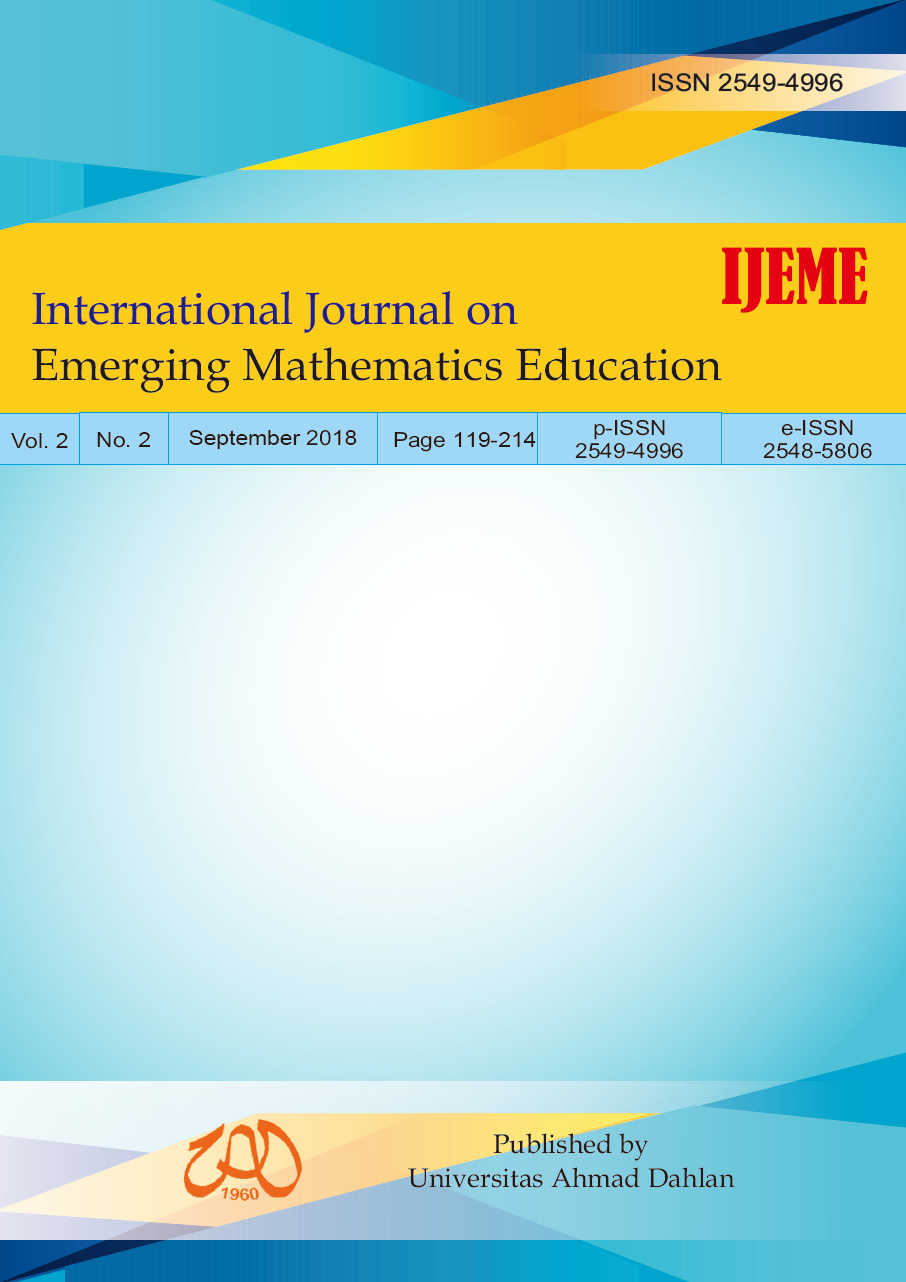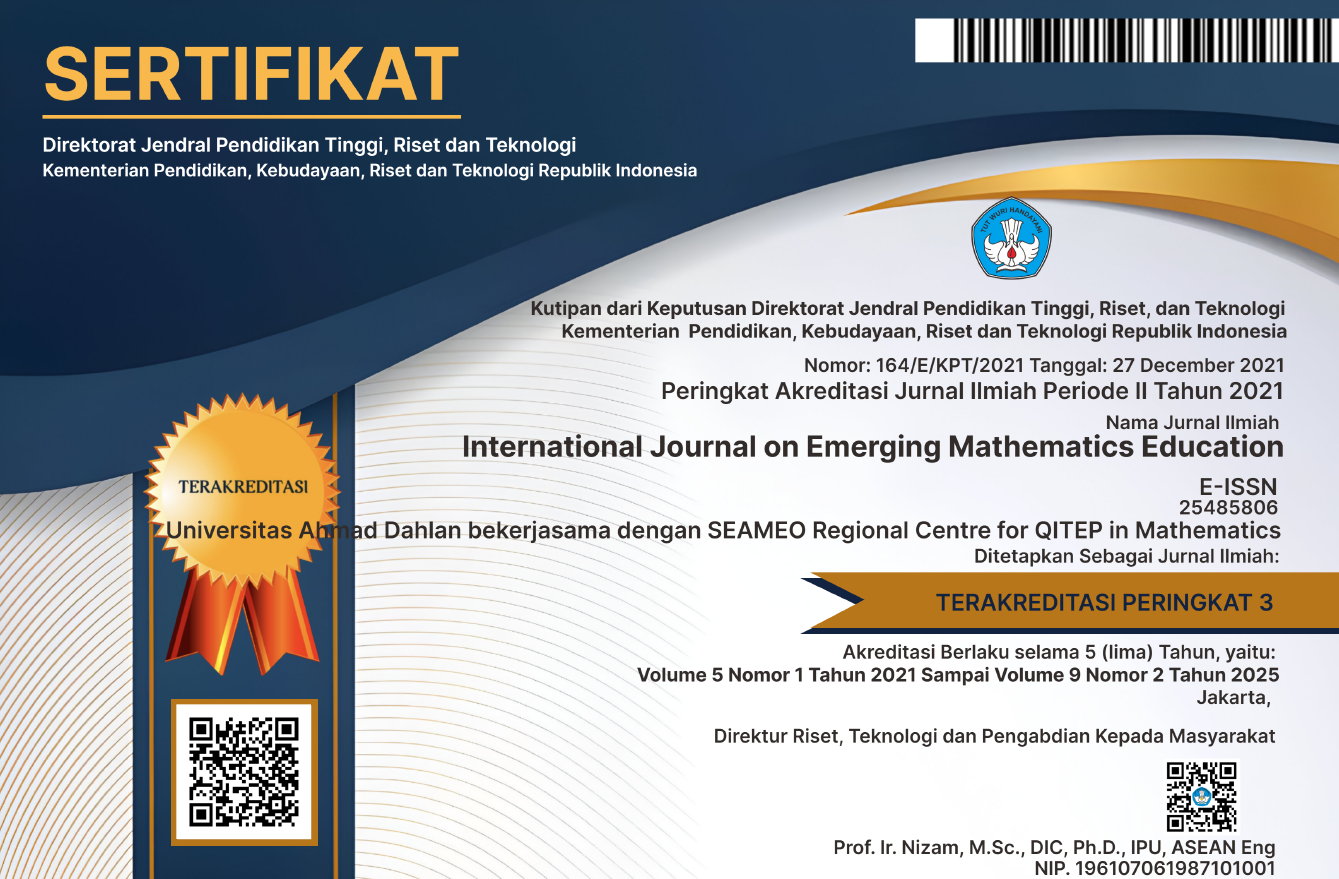Game-Based Learning in Problem Solving Method: The Effects on Students’ Achievement
DOI:
https://doi.org/10.12928/ijeme.v2i2.10564Keywords:
game-based learning, problem solving, quasi experiment researchAbstract
This study compared the effects of game-based learning and textbook on students achievement. A problem solving method was employed in learning processes in the classroom. One hundred and thirteen students of grade eight from three junior high schools in the Province of Yogyakarta, who were selected using convenience sampling, participated in this study. The study employed a quasi experiment with a pretest-posttest control-group design. The data were collected through a pre-test, post-test, and questionnaire. The data were analysed using ANOVA, indicating that the students who were exposed to the game-based learning within problem solving approach significantly outperformed their counterparts who were exposed on the basis of textbook within problem solving. The data from questionnaire revealed that the students preferred game-based learning because they could understand the materials with enjoyable and easily.References
Abdulwahed, M., Jaworski, B., & Crawford, A. (2012). Innovative approaches to teaching mathematics in higher education: A review and critique. Nordic Studies in Mathematics Education, 17(2), 49–68.
Ainley, M. (2010). Interest. International Encyclopedia of Education, 612–617.
Alessi, S. M., & Trollip, S. R. (2001). Multimedia for learning: Methods and development (3rd ed.). Boston: Allyn and Bacon.
Ali, R., Hukamdad, Akhter, A., & Khan, A. (2010). Effect of using problem solving method in teaching mathematics on the achievement of mathematics students. Asian Social Science, 6(2), 67–72.
Balakrishnan, V., Liew, T. K., & Pourgholaminejad, S. (2015). Fun learning with Edooware - A social media enabled tool. Computers and Education, 80, 39–47.
Barzilai, S., & Blau, I. (2014). Scaffolding game-based learning: Impact on learning achievements, perceived learning, and game experiences. Computers & Education, 70, 65–79.
Dabbagh, N., Benson, A. D., Denham, A., Joseph, R., Al-Freih, M., Zgheib, G., … Guo, Z. (2016). Mobile learning. Learning Technologies and Globalization.
Fan, L., Zhu, Y., & Miao, Z. (2013). Textbook research in mathematics education: development status and directions. ZDM, 45(5), 633–646.
Fuson, K. C., Kalchman, M., & Bransford, J. D. (2005). Mathematical understanding: An introduction. How Students Learn: History, Mathematics, and Science in the Classroom, 217–256.
Graumann, G. (2011). Mathematics for problems in the everyday world. Real-world problems for secondary school mathematics students: Case studies (J. Maasz &). Rotterdam: Sense Publishers.
Greiff, S., Holt, D. V., & Funke, J. (2013). Perspectives on problem solving in educational assessment: Analytical, interactive, and collaborative problem solving. Journal of Problem Solving, 5(2), 71–91.
Gruber, M. J., Gelman, B. D., & Ranganath, C. (2014). States of Curiosity Modulate Hippocampus-Dependent Learning via the Dopaminergic Circuit. Neuron, 84(2), 486–496.
Hannafin, M. J., & Peck, K. (1988). The design, development and evaluation of instructional software. New York: Macmillan Publishing Company.
Huang, B., Hew, K. F., & Lo, C. K. (2018). Investigating the effects of gamification-enhanced flipped learning on undergraduate students’ behavioral and cognitive engagement. Interactive Learning Environments, 1–21.
Jin, G., Tu, M., Kim, T.-H., Heffron, J., & White, J. (2018). Evaluation of Game-Based Learning in Cybersecurity Education for High School Students. Journal of Education and Learning, 12(1), 150–158.
Kemendikbud. (2013). Kurikulum 2013 Untuk Sekolah Mengengah Pertama dan Madrasah Tsanawiyah [2013 curriculum for junior high school and islamic junior high school]. Jakarta: Kementrian Pendidikan dan Kebudayaan.
Lee, C., Li, H.-C., & Shahrill, M. (2018). Utilising the think-pair-share technique in the learning of probability utilising the think-pair-share technique in the learning of probability. International Journal on Emerging Mathematics Education, 2(1), 49–64.
Lepper, M. R., & Cordova, D. I. (1992). A desire to be taught: Instructional consequences of intrinsic motivation. Motivation and Emotion, 16(3), 187–208.
Mohammad, H., Fayyoumi, A., & AlShathry, O. (2015). Do we have to prohibit the use of mobile phones in classrooms? International Journal of Interactive Mobile Technologies, 9(2), 54–57.
Muelas, A., & Navarro, E. (2015). Learning Strategies and Academic Achievement. Procedia - Social and Behavioral Sciences, 165, 217–221.
Muller, E., & Burkhardt, H. (2007). Applications and Modelling for Mathematics - Overview. In B. W., G. P.L., H. HW., & N. (Eds) M. (Eds.), Modelling and Aplications in Mathematics Education (pp. 267–274). Boston, MA: Springer.
NCTM. (2015). Strategic Use of Technology in Teaching and Learning Mathematics A Position of the National Council of Teachers of Mathematics. Retrieved November 1, 2017, from http://www.nctm.org/Standards-and-Positions/Position-Statements/Strategic-Use-of-Technology-in-Teaching-and-Learning-Mathematics/
Niss, M., Blum, W., & Galbraith, P. (2007). Introduction. In W. Blum, P. L. Galbraith, H.-W. Henn, & M. N. (Eds.) (Eds.), Modelling and Applications in Mathematics Education (pp. 3–32). New York: Springer.
Ohlsson, S. (2012). The Problems with Problem Solving: Reflections on the Rise, Current Status, and Possible Future of a Cognitive Research Paradigm. The Journal of Problem Solving, 5(1), 101–128.
Permendikbud. (2016). Peraturan Mentri Pendidikan dan Kebudayaan Nomor 22 Tahun 2016 Tentang Standar Proses Pendidikan Dasar dan Menengah.
Polya, G. (1987). Mathematical Discovery on Understanding, Learning and Teaching Problem Solving. New York: John Wiley & Sons.
Prahmana, R. C. I., Zulkardi, Z., & hartono, Y. (2012). Learning multiplication using indonesian traditional game in third grade. Journal on Mathematics Education, 3(2), 115–132.
Rideout, J. V., Foehr, G. U., & Roberts, D. F. (2010). Generation m2 : Media in the lives of 8 to 18-year-olds. London: Kaiser Family.
Rouse, R. (2005). Game design: theory & practice. Plano, TX: Wordware Publishing, Inc.
Schrittesser, I., Gerhartz-Reiter, S., & Paseka, A. (2014). Innovative Learning Environments: about traditional and new patterns of learning. European Educational Research Journal Volume 13 Number 2 2014, 13(2), 216.
Setyaningrum, W. (2016). Teachers' Perception towards ICT in Mathematics Class: A case study in Yogyakarta Secondary Schools. Proceeding of 3rd International Conference on Research Implementation and Education of Mathematics and Science 16-17 May 2016. Yogyakarta: UNY.
Shabalina, O., Mozelius, P., Malliarakis, C., & Tomos, F. (2015). Creativity-based learning versus game-based learning. Communications in Computer and Information Science, 535, 720–733.
Starcic, A. I., & Cankarjeva, E. (2010). Educational technology for the inclusive classroom. Educational Technology, 9(3), 26–37.
Su, J.-M., Tseng, S.-S., Lin, H.-Y., & Chen, C.-H. (2011). A personalized learning content adaptation mechanism to meet diverse user needs in mobile learning environments. User Modeling and User-Adapted Interaction, 21(1–2), 5–49.
Sulisworo, D. (2013). The paradox on IT literacy and science’s learning achievement in secondary school. International Journal of Evaluation and Research in Education, 2(4), 2252–8822.
Waddell, J. C., & Peng, W. (2014). Does it matter with whom you slay? the effects of competition, cooperation and relationship type among video game players. Computers in Human Behavior, 38, 331–338.
Downloads
Published
How to Cite
Issue
Section
License
License and Copyright Agreement
In submitting the manuscript to the journal, the authors certify that:
- They are authorized by their co-authors to enter into these arrangements.
- The work described has not been formally published before, except in the form of an abstract or as part of a published lecture, review, thesis, or overlay journal. Please also carefully read the International Journal on Emerging Mathematics Education (IJEME) Author Guidelines at http://journal.uad.ac.id/index.php/IJEME/about/submissions#authorGuidelines
- That it is not under consideration for publication elsewhere,
- That its publication has been approved by all the author(s) and by the responsible authorities, tacitly or explicitly, of the institutes where the work has been carried out.
- They secure the right to reproduce any material that has already been published or copyrighted elsewhere.
- They agree to the following license and copyright agreement.
Copyright
Authors who publish with the International Journal on Emerging Mathematics Education (IJEME) agree to the following terms:
- Authors retain copyright and grant the journal the right of first publication with the work simultaneously licensed under a Creative Commons Attribution License (CC BY-SA 4.0) that allows others to share the work with an acknowledgment of the work's authorship and initial publication in this journal.
- Authors are able to enter into separate, additional contractual arrangements for the non-exclusive distribution of the journal's published version of the work (e.g., post it to an institutional repository or publish it in a book), with an acknowledgment of its initial publication in this journal.
- Authors are permitted and encouraged to post their work online (e.g., in institutional repositories or on their website) prior to and during the submission process, as it can lead to productive exchanges, as well as earlier and greater citation of published work.
![]()
Ciptaan disebarluaskan di bawah Lisensi Creative Commons Atribusi-BerbagiSerupa 4.0 Internasional.





